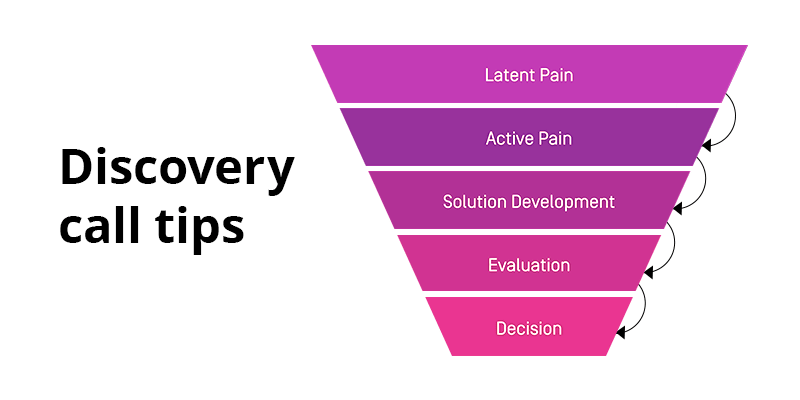How to Rope in Your Customers with Effective Discovery Calls
Are you struggling with your discovery calls?
As it turns out, many reps and organizations lose out on prospective customers right on the first call. Unless you deliver an effective discovery call, your prospects will not show any interest in your products or services. So you can forget about converting or selling to these guys.
Today, we’re going to tell you how to make the most effective discovery call that will create an instant rapport with your customers. But first, a few words on discovery calls in general.

What is a Discovery Call?
The discovery call is the first call made to your customers. The purpose of a discovery call is to determine whether a prospect is right for your products and services. Sales reps ask a range of discovery call questions to qualify leads and gather important information about prospects. Based on that information, the reps can plan the next stages and optimize the sale process to lock in a new customer.
Now we’re going to show you how you can make discovery calls like a pro and create a relationship with your customers right from the word “hello!”

1. Prepare and Research to Make the Perfect Discovery Call
Though it’s called discovery call, you should have some basic information about your prospect before you begin the discover process. Having the right information will help you plan your conversations and help you adopt a personalized approach to engaging your lead.
Gather Personal Data
Do some research about the person you’ll be talking to. Look for previous conversations with your company and take note of important points. Go through your CRM and call tracking reports to refer to any past interactions with the customer. Visit their LinkedIn profile or social media accounts for personal details. Show your customers that you care!
Collect Company Information
If you are in B2B or selling to a company, find out everything you can about the organization. Browse their company website, portfolio, background and any available resources to bolster your understanding. With the right information, you can sell and push your products with more effectiveness.
Come Up with Rapport-Building Questions
Keep some questions handy to build rapport with your prospect. The idea is to ease in to the business and to strike a friendly conversation.
The best approach is to avoid questions that are too generic, like “how’s the weather?” Instead, weave the questions around your prospect’s interests.
2. Making the Perfect Discovery Call
You should set the expectations clear from the very beginning when you strike up a conversation with your prospect. Remember that discovery calls are not one-way sales pitches and need to be conversational.
Discovery Call Opening
You shouldn’t spend more than 45 seconds on your opener. Appreciate your prospect for giving their time and check in on the end time: “We have 20 minutes scheduled to talk today; is that fine for you?”
Also, make the end goals of the discovery call clear: “The end goal of our call is to assess your requirements and how our solution can help you. If you find it suitable, we can discuss the next steps.”
Always make your prospects feel like they are in control so that they don’t take it as another boring sales call!
Confirm Goals and Set the Agenda
Set the agenda for the discovery call right at the beginning, and then ask your customer about their goals. Use the opportunity to discover more about your prospect, learn about their circumstances, and build value. An example script to set the agenda can be:
“The goal of this call is to learn more about your situation and how we can help. If you want to move forward afterwards, then we’ll schedule another appointment to provide a demo. Is that okay with you?”
Shoot Your Qualification Questions
Ask relevant and meaningful questions to determine whether the prospect is right for your product or solution. You should only invest your energy on prospects that can result in sales, and avoid those that are not the right fit.
Every organization has a different lead qualification process, but they all share some common aspects. Let’s explore some questions you can ask to probe your prospect.
To uncover prospect pain points:
- “Why do you want to make a change now?”
- “How did you try to solve your challenges so far?”
- “Have you made similar decisions in the past?”
To determine their purchasing authority:
- “What is your purchasing process?”
- “Do you need to consult any stakeholders to make purchases?”
To get an idea of your prospect’s budget:
- “Do you have a budget ready for the product?”
- “Where are you looking to invest?”
The aim of this step is to find out who you’re speaking to and what they actually have the power or responsibility to do.
Become a Storyteller
Customers like to know how your offerings can help them. The best way to do this is to tell a story, showing how your solutions helped other clients. An example script can be:
“One of our clients who has similar pain points was able to save 30% of their time with our automation solution. We also found the productivity rate increased by 20%. Do you think you can also automate your workflow for better results?”
3. End Your Discovery Call and Schedule Next Steps
By now, you’ve discovered the challenges and pain points of your customers. Now is the time to close the call and discuss the next steps and logistics. But don’t just offer a demo right away! Take some time to discuss how your solution or features help solve customer pain points specifically.
For example, show your prospect how feature X can help them save time and increase ROI. Tell them how a visual dashboard can help manage their operations from a single interface. Make sure you have addressed all pain points and concerns of your prospect before closing the call.
Lastly, schedule an appointment for further meetings and discussions. If the prospect agrees, you can then push for a demo.

Pro Tip: Record Your Discovery Calls for Best Results
We cannot emphasize enough on the need to record your discovery calls. You can use call tracking solutions like CallGear to record calls and even derive transcripts from those calls. Call recordings serve as a ready source of information as your reps are not going to remember everything spoken over the course of a call. It also eliminates the need to take down notes or make manual entries of customer information.
You can also use call recording to evaluate the performance of your reps and identify those who are not performing well. Call recordings of top reps can also serve as training material to coach and prepare new or inexperienced reps to make better discovery calls.

Wrapping Up
Take time to research your prospect and prepare the right questions to make your discovery calls successful. You can also follow a discovery call template with some common questions to use as a start. Good luck!